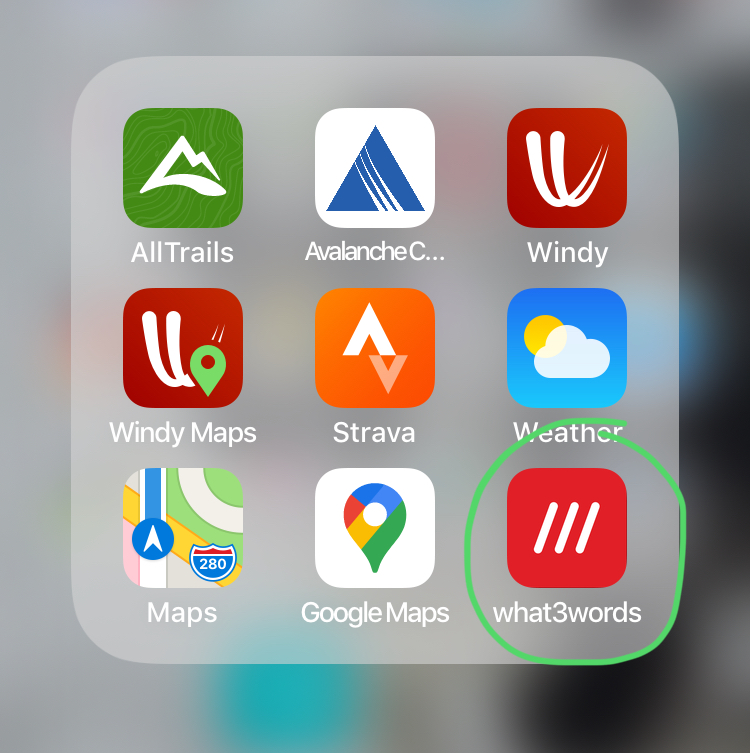What 3 Words (W3W) is a free app that uses your smartphone’s GPS signal to locate you anywhere in the world, on land or water. The entire surface of the globe is divided into 3 metre by 3 metre squares, each with a unique 3-word locator. W3W is available in 48 languages and is becoming popular as a way to find difficult addresses, pinpoint exact locations, and locate lost outdoor adventurers. W3W has partnerships with Google Maps, Tom-Tom, and some car manufacturers that are pairing it with their in-car navigation systems. When I first encountered this app, I thought it sounded brilliant and immediately downloaded and tried it, thinking it could be an added safety tool on backcountry trips. It’s a simple app that works as advertised, but sometimes it gives a different set of 3 words for the same location, depending on how much you are moving around. After playing around with it for a while and perusing a few blogs and social media threads about W3W, I have started to think about how people tend to gravitate toward new apps and technology solely because of the hype surrounding them, when they might already have the tools to do the same job. All of the different apps I have used in the MET program for group communication and collaboration come to mind.
Reasons NOT to depend on W3W in the backcountry:
- If you have a smartphone with GPS and have a phone signal, you don’t need W3W to relay your location. Android phones and iPhones come standard with features (such as Apple Maps, GPS, and Find My Phone) which can pinpoint your location and share with friends or emergency services. As Marlis pointed out in her Life360 post, it is fairly simple to track someone’s smartphone, as long as the GPS is turned on.
- W3W doesn’t need a data connection for using the GPS locator, but does require you to have cell service in order to communicate your 3-word location, and many back-country locations are far from any reliable cell service.
- Using a smartphone in remote locations depletes the battery, as does cold weather. Many outdoor adventurers and workers carry portable battery packs to charge smartphones, but these add weight to a backpack.
- Smartphone signals interfere with transceiver (avalanche beacon) signals and are therefore detrimental during an emergency search.
- There are better mobile devices available that are designed to keep people safe in remote locations. These are not free, but many have reasonable monthly and/or yearly rates for people serious about getting far away from civilization. I use an older SPOT satellite device with a yearly membership that sends messages to predetermined contacts and allows close-to real time tracking on the SPOT website. The SPOT has paid for itself in peace of mind as my family’s emergency contacts are able to track our progress on back-country trips and receive daily check-in notices. My husband used it when he cycled across Canada, which I linked to Facebook, making it fun for all our friends and family to watch and debate how far he would manage to ride each day. Many newer satellite devices allow real-time messaging by connecting to your smartphone and have flexible payment plans. The following is a comparison of satellite tracking devices for when you’re adventuring or working out of cell service range. When I eventually replace my older SPOT, which one do you think I should get? – Best Satellite Messengers of 2021
- No technology replaces common sense and the foresight of preparing well for your adventure and leaving a detailed plan with your emergency contact(s). If something goes wrong on your trip and technology fails you, a rescue can still be mounted in time. That being said, I have switched from a paper-based plan left with my in-laws to the AdventureSmart app when we go into the back-country. You can use the app to plan your adventure and send it to your emergency contacts, who are sent a notification if you don’t report in by your expected return time. You do not need to be connected to this app at all times.

Footnote – I was mostly interested in the practical aspects of navigation and location using technology in the back-country, but I came across this interesting blog that gets into the issues of open-source information and the proprietary nature of W3W’s database – Why Bother with What 3 Words?

This is a great analysis of W3W Lori.
As much as the class has been in discussions about the great tech developments in mobile, not much has been posted on the limitations and negative aspects of mobile use. Though we may have not dived as far into this discussion for this term, it does not mean that the discussion should end here. A critical analysis of any mobile device is essential for this blog. So thanks for breaking the ice to its fullest with your analysis of W3W.
Hi Lori,
I appreciate how you shared your thoughts on this app, from excitement to revision. The ability to see the needs beyond the glitter is one more skill to teach our students.
I also wonder if we are too quick to hand over our cognitive abilities to devices. My dad is able to give the geolocation (latitude/longitude) of major cities around the world. My aunt knows all her appointments and times for medication for herself and her husband. My best friend prefers choosing a date, time and place to meet up and will not use an SMS for a last minute change.
When we cycled across Canada (for our honeymoon!) we used sporadic access to the internet and lots of postcards to keep in touch with our families. We left our phones behind!
It could be interesting to have students plan an adventure – camping, traveling, or other activity, first with and then without their mobile devices. Perhaps by comparing their own self-reliance to their device-reliance, they can determine the minimum apps they truly need, which would also improve the functionality of their devices!
Hi Evelyne,
I am impressed that you biked all the way across Canada without your devices. My husband’s original plan was just to check in once a day, but his parents’ peace of mind won out and he agreed to use the SPOT device. He has always said that when we retire from teaching, his smartphone is going to get chucked in the ocean, but I wonder if it will be possible in the next decade to live without a mobile device? So many of our daily interactions are now through apps and there is an expectation to be connected. When our community was evacuated in 2017 due to the wildfires, the Canadian Red Cross volunteers kept referring many of our older residents who normally did not use the internet to their website for information and expected them to log into the site and use online banking to receive their compensation money. This resulted in a large percentage of people who were frustrated and unable to receive much needed relief.